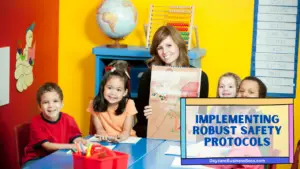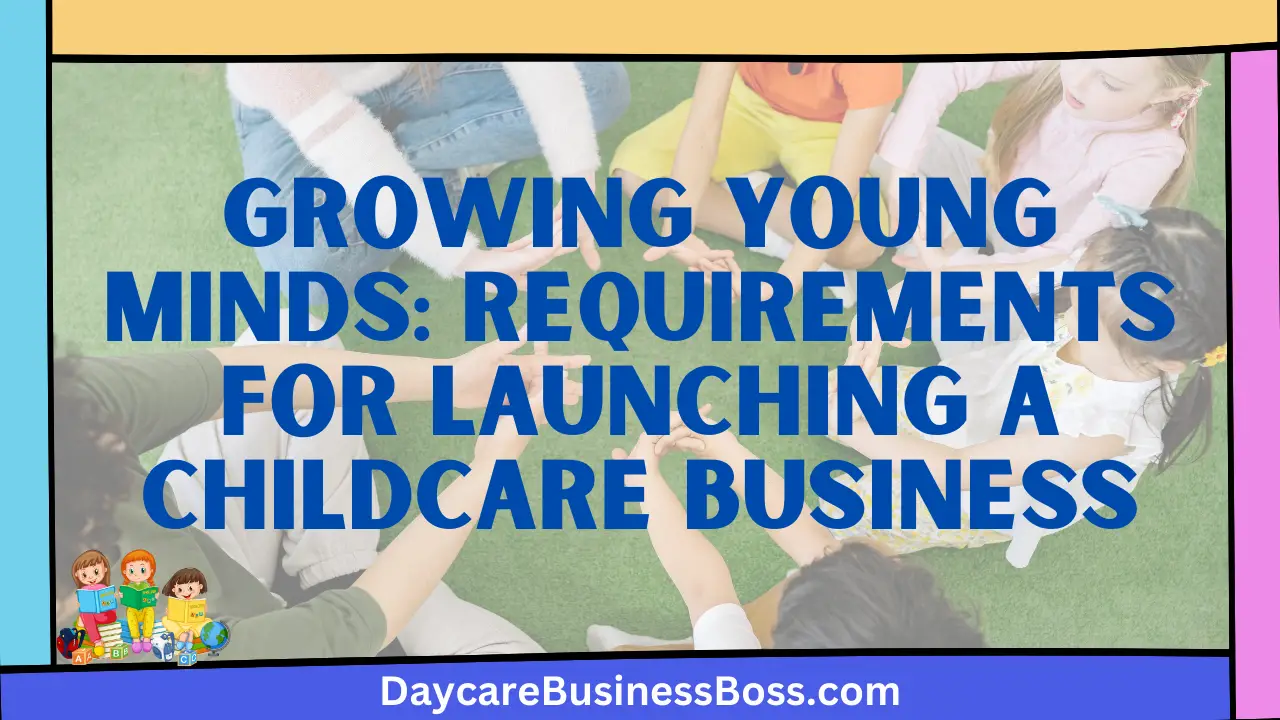Setting off on the adventure of launching a daycare business is both a fulfilling and ambitious endeavor. This endeavor has the potential to nurture young minds, provide a secure sanctuary for children, and contribute to their growth and development during their formative years. However, the road to establishing a thriving childcare business is paved with critical requirements that must be followed to protect the children’s well-being and the enterprise’s legal integrity.
The most useful steps for commencing a childcare business involve drafting a business plan, securing suitable premises, obtaining licensing, implementing robust safety protocols, hiring trained staff, providing age-appropriate activities, obtaining insurance, and adhering to local regulations.
In this article, we will look at the key prerequisites for starting a childcare business. These requirements create the essence of a daycare business, ensuring a loving atmosphere for children while instilling trust in parents and guardians.
Drafting a Comprehensive Business Plan

A well-written business plan is the foundation of every efficient childcare business. This plan is more than just a document; it is a navigational instrument that guides you through the genesis phase and extends its influence into the future of your firm. This crucial blueprint paints a vivid image of the course you intend to take.
A thorough business plan digs into different aspects, including your goals, identifying your target audience, outlining the services you’ll offer, and outlining the techniques you’ll use to capture the market. It’s a financial oracle, accurately estimating potential earnings and expenditures. The operational complexities that will form your childcare venture’s daily rhythm are addressed in this plan.
Its objective, however, goes beyond personal instruction. This blueprint, a treasure trove of ideas, is in high demand among external stakeholders. Lenders seek its counsel to assess the stability of your venture, investors examine its pages to assess the promise of your venture, and licensing officials examine it to ensure compliance with legislation. Thus, a solid business plan not only directs your route but also can open doors of opportunity and credibility, paving the road for the growth of your childcare business.
Read more about: Empower Your Daycare Vision: Discover Free Business Plan Templates
Securing Suitable Premises
Choosing the best location for your childcare facility is a critical decision that will have a huge impact on its development. This decision goes beyond location; it is a deliberate move that can influence both children’s and parents’ overall experience. As you seek a haven that not only guarantees security but also creates an environment of trust and well-being, safety takes center stage.
The facility’s accessibility to parents is a significant aspect. A convenient location simplifies the daily routine for parents, promoting their engagement and instilling confidence in their child’s care. This proximity can enhance the sense of community by establishing bonds between families who share common places.
Space is more than a metric; it’s a blank canvas on which experiences can take shape. A childcare setting should be a haven for children to explore both within and beyond their imagination. Ample indoor and outdoor environments serve as growing playgrounds, allowing for activities that promote physical, cognitive, and social development.
Consider aspects that are inextricably linked to your vision, such as proximity to educational institutions that share your beliefs and residential areas that reflect the lives of the families you will serve. Even the proximity to parks adds to your childcare narrative by providing opportunities for nature-infused experiences.
Obtaining Licensing
When beginning the adventure of a daycare business, licensing is an essential cornerstone. It’s more than just a legal requirement; it’s a pledge to the children in your care. Uncovering the unique tapestry of legislation weaved by your region or country is a critical first step since it connects your endeavor with the legal framework created to protect children’s well-being.
These restrictions encompass a wide range of concerns, all aimed at establishing a safe sanctuary for children. Health and safety requirements construct a fortress that protects them from damage, ensuring the environment is a haven. Carefully planned staff-to-child ratios ensure that each child receives the attention they deserve, establishing a tailored nurturing experience.
Education is woven into the regulatory fabric, emphasizing the need of providing a stimulating environment for young brains. Facility standards create a blank canvas for practical aesthetics, providing children with a safe and inspiring environment. These rules collectively design a caring environment that surrounds children in care and growth.
Obtaining the necessary permits is more than just a formality; it is a commitment to provide an atmosphere that is not only legally compliant but also ethically aligned with the trust your parents place in you. By doing so, you establish a foundation for children’s safety, development, and well-being, a place where they can thrive and flourish under your responsible care.
Implementing Robust Safety Protocols

Child safety is an everlasting cornerstone in the area of childcare businesses. It is a responsibility that involves the development and implementation of stringent safety measures. These protocols, which are deeply woven into the fabric of your operations, serve as a fortress of safety for the young lives in your care.
Detailed emergency protocols serve as a guidepost in times of uncertainty. These strategies enable your staff to respond quickly and efficiently, assuring the safety of the children in any situation. Child-proofing the premises provides an important layer of defense, removing potential hazards and nurturing an environment in which exploration is synonymous with safety.
Medication administration and allergy management necessitate a precise approach. Your protocols must completely include the process, allowing no opportunity for error. This protects not only the children’s health but also the parents’ trust in you.
Regular safety drills, similar to choreographed symphonies, practice the team’s reaction to various eventualities. These drills not only build a sense of preparedness but also foster a vigilant culture. Extensive training sessions guarantee that each member of staff is well-equipped to manage the unexpected with competence and confidence.
By taking a proactive attitude to safety, you can transform your childcare business into a haven. It becomes a place where parents may entrust their most valuable possessions, knowing that every precaution has been taken to assure their safety. This dedication to safety not only coincides with ethical duty but also strengthens your company’s reputation as a defender of trust and care.
Read more about: Childcare Chronicles: Key Requirements for Running a Daycare
Hiring Trained Staff
The composition of your personnel is the beating heart of your childcare business, exerting significant influence over the quality of care and education you provide. These people are the architects of a child’s everyday experiences, so the selection process must be done with care.
The search for new employees begins with looking for people who have not only the qualifications but also a genuine desire to help young minds grow. Candidates with relevant qualifications in early childhood education or fields closely connected with children’s developmental requirements should be given preference. This foundation guarantees that their expertise is bolstered by theory and practice, further enriching the experiences they create.
Credentials, however, are only one aspect of the selection process. Background checks serve as gatekeepers, revealing insights that shed light on a candidate’s past. Interviews, similar to discovery discussions, reveal the character of the individual – their ideologies, approach to teaching, and empathy for youngsters.
A committed heart and compassionate spirit are non-negotiable characteristics because they lay the framework for the emotional resonance that is essential in caregiving. Working with children is the bridge that connects theory to transforming experiences.
Providing Age-Appropriate Activities
A cornerstone of childcare quality is creating a setting that captivates and teaches young brains. This critical aspect of your daycare business is critical in determining the trajectory of children’s growth and development.
Creating a world that engages and stimulates needs careful planning. Create activities that appeal to their developmental stages, while also encouraging cognitive, physical, and social growth. These age-appropriate activities weave the fabric of their educational journey.
Play-based learning, an enthralling symphony of knowledge and pleasure, serves as a basis for the development of curiosity and creativity. Art serves as a canvas for self-expression, developing fine motor abilities as well as imagination. Music, as a universal language, instills rhythm and harmony in their lives, cultivating a deep respect for the arts.
Storytelling, as a portal to other regions and imaginative realms, fuels both language skills and a love of narrative. The vast outdoors invites exploration, developing a relationship with nature and instilling a sense of awe.
The essence of a well-rounded program is a mosaic of activities that are smoothly integrated into your curriculum. It demonstrates your attention to their holistic development, to molding not only information but also key life skills. You set the way for children to not only excel academically but also to embrace a world full of opportunity by providing a caring blend of learning and play.
Obtaining Insurance

Engaging in childcare enterprises necessarily implies a range of uncertainties, emphasizing the critical need for obtaining adequate insurance coverage. Insurance acts as a vital buffer, protecting your company from the uncertainty that comes with caring for children.
Liability insurance takes center stage, acting as a protector in the event of an unforeseen incident. Accidents, injuries, and legal claims are the shadows that periodically cast a shadow over the daycare environment. This insurance functions as a protective cocoon, providing cash assistance and legal protection when the unexpected occurs.
The complexities of a childcare business may necessitate various types of insurance. Property insurance protects your investment from the whims of fate by acting as a bulwark against the vagaries of physical harm to your establishment. Workers’ compensation enters the picture to ensure that your employees’ well-being is not jeopardized, assisting if job injuries occur.
Customization corresponds to the variety of your services and region. Depending on the nature of your offerings and your geographical location, you may require additional coverage choices to address special conditions.
Insurance cultivates peace of mind in addition to financial stability – a serene confidence that your firm is fortified against the storm of uncertainties. It’s a safety net that protects not only your finances but also your reputation and devotion to the people you assist. By accepting insurance, you strengthen the foundation of your firm, providing a stable and trusting environment.
Read more about: Childcare Business Insurance Uncovered: Cost Considerations Explored
Adhering to Local Regulations
In the complex world of childcare, strict adherence to local standards is an unquestionable must. These standards serve as the foundation for your dedication to the safety, development, and well-being of the children entrusted to your care. They lay forth a structure that wraps a soothing embrace around the entire scope of your childcare business.
These precisely crafted criteria create a protective cocoon around the youngsters, ensuring that every aspect of their environment meets high requirements. Health and sanitation standards establish a haven for children, a place where they can grow in a safe environment.
Your employees’ qualifications become a testimonial to your commitment. Staff qualification regulations ensure that those guiding and nurturing the children have the expertise and skills required for their holistic development. The layout of your institution is closely woven with the laws, promoting a safe and exploratory environment.
Deliberately defined operational procedures ensure the smooth orchestration of the everyday routine. Adhering to these regulations is more than simply a formality; it’s a commitment to the children and their families, a witness to the ethics and principles that guide your childcare business.
Regular inspections, like a symphony of accountability, mirror your steadfast dedication to compliance. Adhering to these requirements is more than just a requirement; it’s a guarantee to uphold the highest standards, proof that your credibility and reputation are built on a solid foundation of accountability. By following these principles, you create an environment where trust thrives and children’s growth is nurtured within a sanctuary of compliance and care.
Frequently Asked Questions

Why is it vital to create a business strategy when launching a daycare business?
A business plan is a road map for your daycare business. It describes your objectives, target market, products, marketing tactics, and financial estimates. It enables you to make informed decisions, get funds, and demonstrate the potential of your firm to investors and licensing authorities.
What elements should I take into account while looking for a good location for my childcare business?
It is critical to select the appropriate site. Take into account parent accessibility, closeness to residential areas and schools, and the availability of indoor and outdoor space. Check that the premises meet all safety and regulatory criteria, as well as the number of children you intend to enroll.
Why is licensing required for a childcare business?
Licensing is a legal necessity that assures your childcare establishment satisfies certain safety, health, and educational criteria. It shows your dedication to providing a safe and loving environment for children. Licensing also aids in the development of trust with parents and the establishment of credibility in the business.
To learn more on how to start your own daycare checkout my startup documents here.
The information provided by DaycareBusinessBoss.com (“The Site”) is for general informational purposes only. All information on the Site is provided in good faith, however, we make no representation or warranty of any kind, express or implied, regarding the accuracy, adequacy, validity, reliability, availability or completeness of any information on the Site. Under no circumstance shall we have any liability to you for any loss or damage of any kind incurred as a result of the use of the Site or Reliance on any information provided on the Site. Your use of the Site and your reliance on any information on the Site is solely at your own risk.
This blog post is for educational purposes only and does not constitute legal advice. Please consult a legal expert to address your specific needs. Terms and Conditions. (https://daycarebusinessboss.com/terms-conditions/)

Meet Shawn Chun: Entrepreneur and Childcare Business Fan.
I’m a happy individual who happens to be an entrepreneur. I have owned several types of businesses in my life from a coffee shop to an import and export business to an online review business plus a few more and now I create online daycare business resources for those interested in starting new ventures. It’s demanding work but I love it. I do it for those passionate about their business and their goals. That’s why when I meet a childcare business owner, I see myself. I know how hard the struggle is to retain clients, find good employees and keep the business growing all while trying to stay competitive.
That’s why I created Daycare Business Boss: I want to help childcare business owners like you build a thriving business that brings you endless joy and supports your ideal lifestyle.

